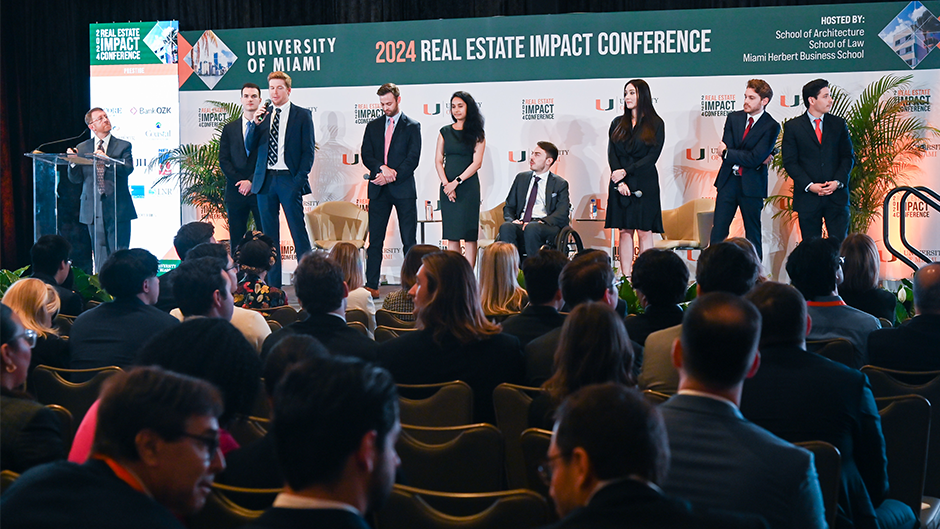Cities all over the world are at a crossroads in which growth and expansion must be balanced against a variety of challenges, including the preservation of key natural resources such as water and green space; the mitigation of natural hazards like flooding, windstorms, and fire; rapidly rising insurance costs; and a growing shortage of housing at accessible price points. These issues have been at the core of Miami's past two development cycles and continue to exert greater and greater pressure on those working in real estate to provide effective solutions.
"What's Next for a Resilient Miami?" was the focus of this year's Real Estate Impact Conference. The event, hosted by the School of Law, School of Architecture, and Miami Herbert Business School, featured noted leaders with expertise in commercial and residential development, global climate news, infrastructure and civil engineering design, and real estate law and finance.
"South Florida opens 2024 looking stronger, more diversified, and literally stands as the place to be for real estate," said Charles C. Bohl, professor and founding director of the Master of Real Estate Development + Urbanism Program, the interdisciplinary one-year graduate program that combines the strengths of the University of Miami's schools of architecture, business, and law to create a world-class program that blends the fundamentals of real estate development with livable community planning and design. "It is not, however, without challenges," he continued in welcoming remarks. "In facing resiliency and sustainability, the University of Miami seeks to create the next generation of leaders and visionaries—with programs in every field that connects to real estate, including construction, business, law, finance, and beyond."
University President Julio Frenk echoed this sentiment in his opening speech, highlighting the University of Miami's unique opportunity to act as a leader and catalyst.
"It seems as though it was the university's destiny to be at the forefront of these issues," he stated. "We want to drive change, deliver solutions, and collaborate with the community, government, and private industry. We need to educate and provide tools for promoting shared understanding. Just as our mascot, the ibis, is a symbol of resiliency, so too must the University of Miami be a trusted resource in building resilient communities now and in the future."
In an effort to deliver answers to the conference question, experts pulled back the curtain on an industry undergoing significant transitions and discussed what efforts are working well, which appear to hold promise for the future, and the problems that must be addressed quickly if cities like Miami are to succeed both socially and economically.
"The Annual Real Estate Impact Conference gives our students unparalleled access to thought leaders in the commercial real estate industry through the invited presenters and the invitation-only guest list," said Andrea Heuson, Miami Herbert professor and program director of the Accelerated MBA in Real Estate program. "The event allows for current students to mingle with alumni in the commercial real estate business from all over the country to help build their networks and open the doors for internships and future career opportunities."
As Miami is at the forefront of resilient development not simply because it wants to be, but because it has to be, UM students can be at the center of a movement the world is watching.
"This UM Real Estate Impact Conference was a great success. The School of Law and the Real Property Development Program were proud to be co-sponsors," said Thomas Nealon, director of the program. "The conference offered our students a wonderful opportunity to network and interact with real estate industry professionals."
The conference was made possible through the support of more than 100 sponsors, including presenting sponsors, Douglas Elliman Real Estate, the Kislak Family Foundation, and Witkoff.

